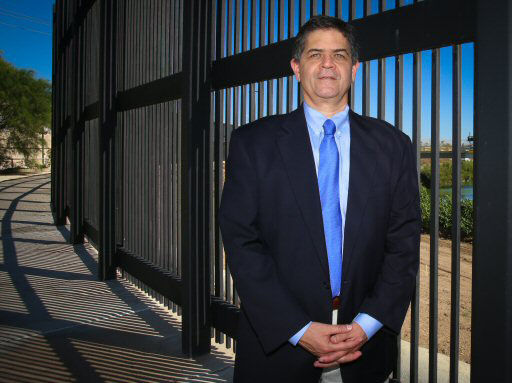WESLACO — A need for higher skilled workers was one of many points made during a Tuesday roundtable featuring two congressmen and cross-border trade experts.
After several thorough presentations regarding trade between the United States and Mexico and the relationships between the countries, U.S. Rep. Filemon Vela, D-Brownsville, asked University of Texas Rio Grande Valley economics professor Alberto Davila about labor in the region.
Vela said he has heard of companies interested in moving operations to the Valley, but have concerns the Valley does not have the workforce to sustain the business.
“I was having a hard time buying it until recently,” Vela said. “About a month ago, a gentleman with a manufacturing facility in the Valley came to me and said, ‘my biggest problem is I’ve got jobs that pay $70,000 a year that I can’t find people to fill.’ And I keep running into that over and over.”
Davila said at a previous university job, he studied the maquiladora industry in Central America. Well developed vocational education systems attracted the maquiladoras to those Central American areas, Davila said.
“If you were to ask me, I think we need a stronger vocational system in the Valley to be able to meet that particular demand,” Davila said. “It’s the types of education given, offered to our community, that I think is an issue.”
One audience member also offered that the Valley tends to lose many of the bright, highly educated natives. He said that if there were more to do, perhaps a thriving culinary scene with “3-Star Michelin” restaurants, or other incentives, there would be more reasons for those people to stay and work in the area.
The prospects of a North American Free Trade Agreement renegotiation were broached several times, with Chris Wilson, Deputy Director of the Mexican Institute at the Wilson Center in Washington, D.C., offering a possible tweak to the current pact. The base of his presentation Monday revolved around one thing the current NAFTA conversation is leaving out: the worker.
“The changes that are really available to be made to NAFTA itself can only help at the margins,” Wilson said. “So what’s needed is another part of the discussion.”
Trade agreements shift economies, Wilson went on.
“The thing is, if you have to prepare your workers to not just survive those changes but be at the forefront of those changes, be able to embrace those changes,” Wilson said. “Just as if a robot revolution is coming, let’s train people to build robots and run robots and fix robots. If a NAFTA revolution was coming 20 years ago, let’s train people to be in the jobs in the industries where we know in the United States we’d see growth. And I think unfortunately we just didn’t do enough of that. I think we can do a better job — it’s not too late to do a better job of those things. But it’s going to be different than the NAFTA discussion.”
And how will elected officials ensure their constituents, the workers, are at the forefront of a potential NAFTA renegotiation?
“I kind of think working backwards is a good idea,” said U.S. Rep. Vicente Gonzalez, D-McAllen. “Finding out what jobs these corporations are looking for. And then having a direct communication with them and our local community colleges and universities to try to create a crop of new employees that are geared up for the task at hand.”
“We’ve been doing that, I’ll give you an example,” Vela said. “There’s a manufacturer out of the City of Brownsville that manufactures tools that came in three weeks ago and basically said we can’t find workers – you’d have a hard time believing it. Out of one school district, we had 3,000 kids graduating in a year and not going to college and he has 20, 30 jobs paying good wages that manufacture tools.
“The thing I learned was that the mechanics involved, the technology involved in manufacturing today is a lot different than the agreement 30 years ago. We appear to have a disconnect between what we’re doing to vocationally train students and to what the jobs are that are out there and that could be out there, and so that seems to be one of the biggest problems we’ve run into.”




